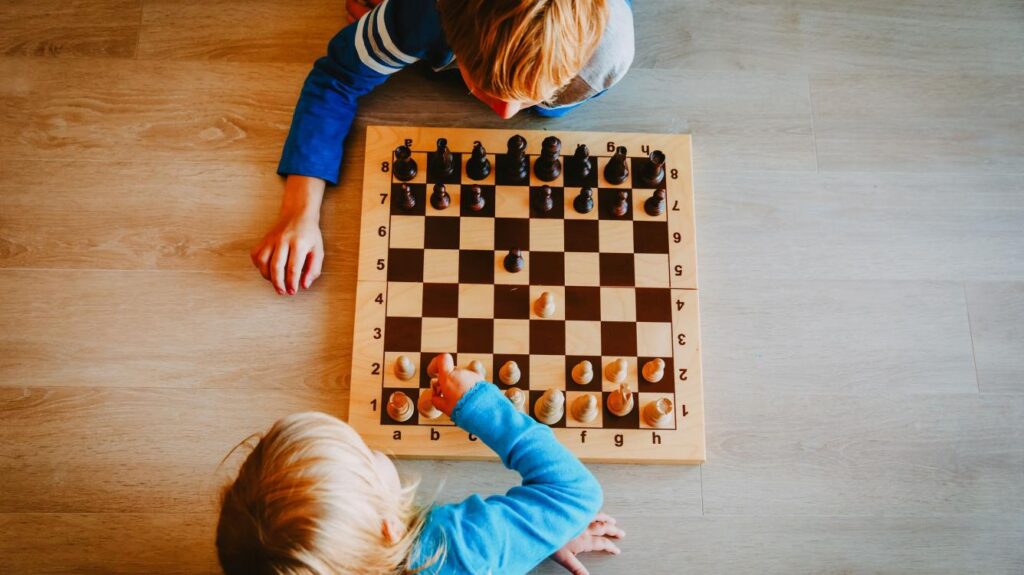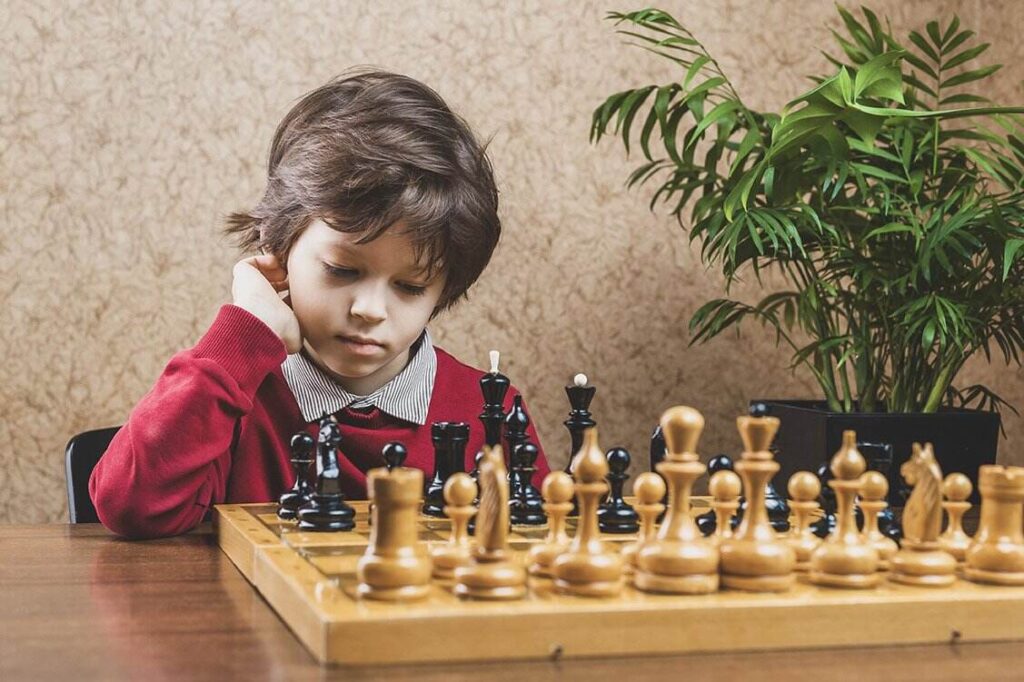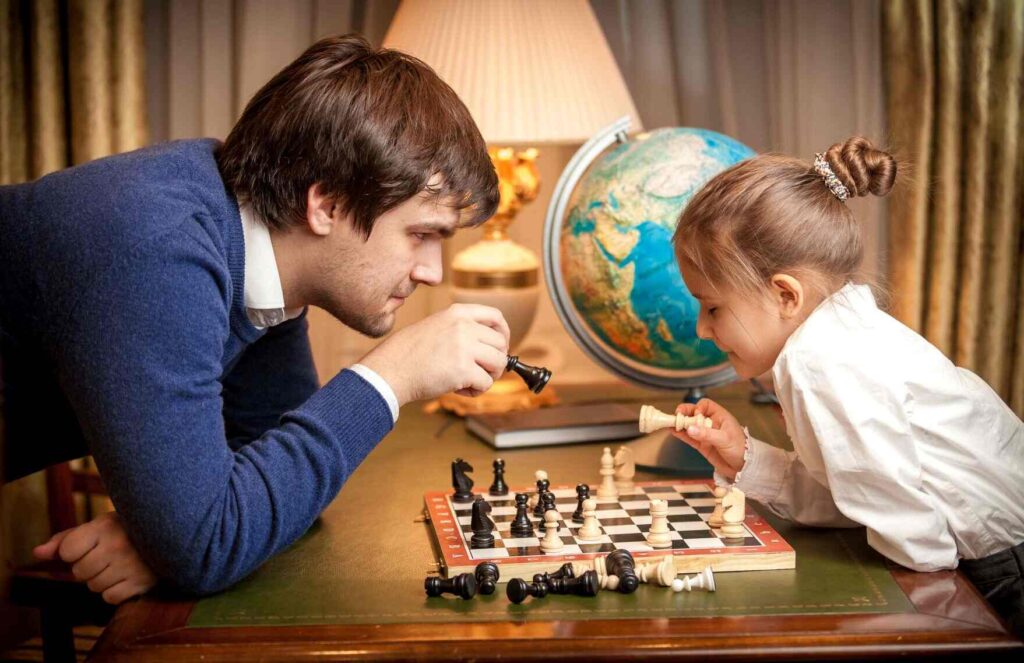Chess is much more than just a game played on a board with 64 squares. It’s an exercise for the mind, a tool that sharpens thinking, and a way to train young minds to solve problems. When children learn chess, they’re not just learning how to move pieces; they are also learning how to think ahead, plan carefully, and approach challenges with a clear strategy.
The skills developed through chess go beyond the game itself and help in daily life. In this article, we’ll explore how chess teaches kids to approach problems strategically, making them better thinkers and decision-makers as they grow up.
The Basics of Strategy in Chess
Before diving into the deeper lessons, it’s important to understand the idea of “strategy” in chess. Strategy refers to the long-term planning that a player uses to outwit their opponent.
Unlike quick, reactive moves, strategic thinking requires players to consider not just the immediate consequences but also the impact several moves ahead.
In chess, there are many different aspects of strategy.
Players need to think about controlling the center of the board, developing their pieces, protecting their king, and planning attacks. But most importantly, they must always stay a few steps ahead, predicting their opponent’s moves and adjusting their plans accordingly.
This type of thinking translates directly into problem-solving in real life. Children who learn how to approach problems strategically in chess are able to apply the same thought process to challenges in school, friendships, and later in their careers.
Thinking Ahead and Anticipating Challenges
One of the first things that children learn in chess is the importance of thinking ahead.
Unlike some games where you can just react to what’s happening, chess requires players to look at the board and consider what might happen next. This is where strategic thinking comes in.
Kids learn to ask themselves questions like, “What will happen if I move this piece here?” or “What could my opponent do next?” By practicing this type of thinking,
children start to understand the importance of predicting outcomes and considering the consequences of their actions. This is a powerful skill not just in chess, but in life.
For example, if a child is faced with a difficult math problem in school, they might break it down and think about the different steps they need to take to solve it.
Just like in chess, they are learning to think ahead and approach the problem one step at a time, rather than trying to solve it all at once.
Patience and Careful Planning
Another major lesson that chess teaches children is patience. In chess, rushing into an attack without thinking it through usually leads to mistakes.
Children learn quickly that they need to be patient, think about their moves, and plan carefully if they want to succeed.
This patience is directly linked to strategic thinking. When faced with a problem, kids who have learned chess are more likely to take their time and consider different options before acting.
They understand that rushing into a decision without fully thinking it through can lead to negative consequences.
Let’s imagine a situation where a child needs to work on a group project in school. Instead of jumping into the first idea that comes to mind, a child who plays chess might suggest sitting down, discussing different ideas, and planning the best approach.
This careful planning leads to better outcomes in both schoolwork and personal situations.
Decision-Making Under Pressure
In chess, the clock is always ticking. Players often have limited time to make their moves, which forces them to make decisions quickly.
Kids who play chess learn how to think under pressure and still make the best possible choice. They understand that rushing can lead to mistakes, but they also know that decisions need to be made in a timely manner.
This ability to make thoughtful decisions under pressure is useful in many areas of life. Whether it’s taking a timed test in school or managing a tricky situation in life, chess players develop the confidence to handle stress without panicking.
Learning from Mistakes
Chess is a game where mistakes happen all the time. Whether it’s losing a piece or missing an opportunity, kids quickly realize that mistakes are part of the learning process.
What’s important is how they respond to those mistakes. Do they give up or do they try to learn from them and improve?
In chess, after every game, players often go over their moves to see where things went wrong. This teaches children a key life skill: reflection. By looking back at what happened, they can figure out how to avoid similar mistakes in the future.
When kids take this lesson off the chessboard, they become more resilient. Instead of feeling discouraged by a setback, they see it as a chance to learn and grow.
Planning for the Future
In chess, every move affects the future of the game. Kids learn quickly that their choices now can shape the outcome later.
This teaches them to plan ahead and think about long-term consequences rather than just short-term gains.
This kind of forward-thinking is helpful in many areas. Whether planning for a project at school or setting personal goals, children become more thoughtful about their actions and their future impact.
They understand that success often requires patience and a well-thought-out plan.
Adapting to Change
Even with the best strategy, a game of chess rarely goes exactly as planned. Opponents may make surprising moves, and situations on the board can shift suddenly.
Kids learn how to adjust their plans on the fly, staying flexible and creative in their approach.
This ability to adapt is valuable in everyday life. When unexpected challenges come up—whether it’s a change in school plans or an issue at home—kids who play chess are more likely to stay calm, rethink their approach, and move forward.
Building Confidence in Problem-Solving
As children get better at chess, they develop a sense of confidence. They begin to trust their ability to solve problems and outthink their opponents.
This growing confidence extends beyond the chessboard, helping kids feel capable of handling challenges in school, relationships, and other areas of life.
By successfully navigating complex chess problems, kids see firsthand that they can tackle difficult situations with patience, thought, and strategy.
This self-assurance is a powerful asset, giving them the belief that they can succeed in whatever they set their minds to.
Problem-Solving Through Creativity

Chess isn’t just about following rules and formulas; it also encourages creativity. There are countless ways to approach a chess game, and sometimes the most unexpected moves can lead to victory.
Kids who play chess are encouraged to think outside the box and come up with creative solutions to tricky positions.
This creative problem-solving skill is incredibly valuable in real life. Whether they’re tackling a challenging school assignment or dealing with a personal issue, kids learn that there’s always more than one way to solve a problem.
Chess teaches them to explore different ideas and not to be afraid of trying something new.
Developing Focus and Concentration
Chess requires full attention. Kids need to concentrate on the board, watch their opponent’s moves, and think about their own strategy.
If they lose focus for even a moment, it could cost them the game. Over time, this helps children strengthen their ability to focus for long periods without getting distracted.
This focus transfers to everyday tasks. Whether it’s studying for an exam or completing a homework assignment, children who play chess are better at staying on task and avoiding distractions.
They understand that maintaining concentration is key to getting the best results.
Breaking Down Complex Problems
Chess positions can often seem overwhelming, especially when there are many pieces on the board. But skilled players know how to break down complex positions into smaller, more manageable parts.
They focus on the most important pieces or threats and deal with those first.
This is an important problem-solving skill. When faced with a complex problem, kids learn to break it down into smaller steps. Instead of feeling overwhelmed, they tackle each part one by one, making the overall problem easier to solve.
This method can be applied in school, at home, or in any situation where a large task seems difficult.
Developing Emotional Control
In chess, not every game will go your way. There will be moments when you lose a piece or when a plan falls apart. Kids who play chess learn how to handle these setbacks without getting frustrated.
They understand that even if things are tough, they can still recover if they stay calm and focused.
This emotional control is useful in everyday life. Whether they are dealing with a tough situation in school or a conflict with friends, kids who play chess know how to keep their emotions in check.
They don’t let setbacks overwhelm them, and they’re able to think clearly even in challenging moments.
Understanding the Value of Time

Time is a key element in chess, especially when playing with a clock. Players must balance thinking carefully and moving quickly, which teaches kids the importance of time management.
Every second counts, and wasting time can lead to rushed decisions or costly mistakes.
In life, time is just as valuable. Kids who play chess become better at managing their time, knowing when to think deeply and when to act swiftly. This skill is particularly helpful when they need to balance schoolwork, hobbies, and other commitments.
Chess instills the habit of using time wisely, preparing children to prioritize tasks efficiently as they grow older.
Encouraging Independence
When playing chess, kids are fully responsible for their decisions. There’s no help from a teacher, no group to share the workload.
They must evaluate the position, decide on their move, and accept the consequences—good or bad. This sense of independence helps children develop confidence in their own thinking and decision-making abilities.
Outside the chessboard, kids who are used to making independent decisions become more self-reliant. They are less likely to wait for someone else to solve their problems and more likely to take initiative when challenges arise.
This independence is crucial as they move through school and into adulthood, helping them navigate life’s challenges with greater ease.
Practicing Sportsmanship
Chess is a game where there is always a winner and a loser. Kids who play learn how to handle both outcomes with grace. Whether they win or lose, they shake hands and respect their opponent. This builds character and teaches children that both victory and defeat are part of life.

Good sportsmanship extends beyond the game. In school, sports, or social situations, kids learn how to be gracious in both success and failure. They understand that it’s not just about winning, but about how they conduct themselves throughout the process.
Strengthening Memory and Recall
Playing chess requires remembering patterns, strategies, and past games. Kids must remember how pieces move, recall various opening sequences, and think back on mistakes made in previous games.
This constant practice helps boost their memory and recall skills.
This mental exercise is beneficial in academic settings. Kids who play chess often show better memory skills, whether it’s recalling historical facts, remembering formulas, or keeping track of details during a project.
Chess helps train the brain to retain and recall information more effectively.
Enhancing Logical Thinking

Chess is a game of logic. Every move has a cause and effect.
Players need to think in a logical sequence: “If I do this, then my opponent might do that.” This type of thinking helps kids develop strong logical reasoning skills, which are essential for problem-solving both in and out of the game.
In school, logical thinking helps kids in subjects like math and science. They learn how to approach problems step by step, using reason and analysis.
Whether solving equations or figuring out how to structure an essay, logical thinking becomes second nature to children who regularly play chess.
Fostering Discipline and Self-Control
Chess is a game that rewards discipline. Kids learn that they can’t simply make impulsive moves.
They need to control their emotions and carefully think through every decision. If they act without thinking, it often leads to mistakes. Over time, this teaches them self-control.
Discipline gained through chess can benefit kids in various areas of life. Whether it’s sticking to a study schedule, focusing on homework, or resisting distractions, the self-discipline learned from chess carries over into other areas.
It helps children stay focused on their goals and avoid distractions that might get in the way.
Building Perseverance
No chess player wins every game. Losing is part of the learning process, and kids quickly realize that they must keep playing, learning, and improving.
Chess teaches perseverance. Children understand that success doesn’t come from giving up after a loss but from continuing to practice and refine their skills.
In life, setbacks are inevitable. Whether it’s a bad grade, a failed project, or a personal disappointment, kids who play chess are better equipped to handle these challenges.
They learn that perseverance is the key to improvement and that failure is just a stepping stone to success.
Improving Spatial Skills
Chess requires players to visualize the board several moves ahead, considering how pieces move and interact. This ability to mentally picture how a situation might unfold helps develop strong spatial skills.
Kids begin to see patterns and positions in their minds, learning to plan and execute moves based on spatial awareness.
These spatial skills are beneficial beyond chess. They help with subjects like geometry, where understanding shapes and spaces is critical.
Spatial awareness also aids in sports, art, and even everyday activities like navigating a new environment or packing efficiently.
Chess as a Life-Long Skill
Chess is not just a game for childhood. Once a child learns chess, it’s a skill they carry for life. As they grow older, the lessons in strategic thinking, problem-solving, and discipline continue to serve them.
It’s a game they can play at any age, making it a valuable life-long skill that keeps their mind sharp.
A Fun Way to Learn
Chess offers an enjoyable way for kids to learn without even realizing it. It’s a fun game that challenges them and makes learning exciting.
Unlike traditional lessons or tasks, chess is both a game and a teacher. It fosters curiosity and encourages kids to enjoy the process of learning and growing.
Promoting Healthy Competition
While chess is competitive, it’s a healthy form of competition. Kids learn how to compete fairly, respect their opponents, and accept both wins and losses gracefully.
This fosters a balanced mindset, where children enjoy the challenge of competing without getting overly frustrated or discouraged.

Strengthening Social Bonds
Chess is also a social game. Whether playing in tournaments, clubs, or with family and friends, chess brings people together.
Children build relationships over the board, sharing experiences and learning from each other. It’s a great way for kids to connect with others while developing their mental skills.
Preparing Kids for Future Challenges
The lessons learned through chess prepare kids for challenges they will face later in life. Whether it’s in school, their career, or personal situations, the strategic thinking, focus, and perseverance gained through chess provide a strong foundation.
Chess sets kids up for success by teaching them how to approach problems thoughtfully and strategically.
A Gift for the Future
Ultimately, chess is a gift you can give to a child that lasts far beyond the game itself.
It teaches skills that enrich their life, helps them grow mentally, and prepares them to face the world with confidence and resilience. By learning chess, kids gain much more than a pastime—they gain tools for success in all areas of life.
Wrapping it up
chess is far more than just a game; it’s a powerful tool for developing strategic thinking, patience, problem-solving, and resilience in children.
The lessons learned on the chessboard—such as planning ahead, adapting to change, managing time, and handling setbacks—help kids approach challenges with confidence and creativity, both in school and in life. By playing chess, children build essential life skills that prepare them for future success, making it a valuable and lasting gift for their growth and development.
If you want to help your child master these skills and start their chess journey, visit Global School of Chess to learn how we can guide them every step of the way!
READ NEXT:

